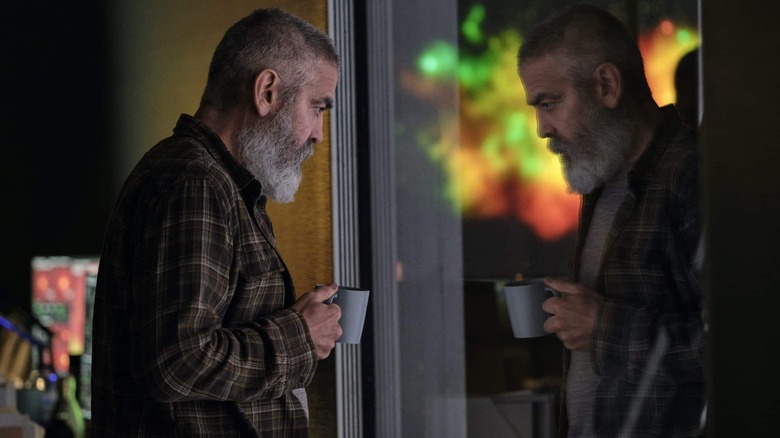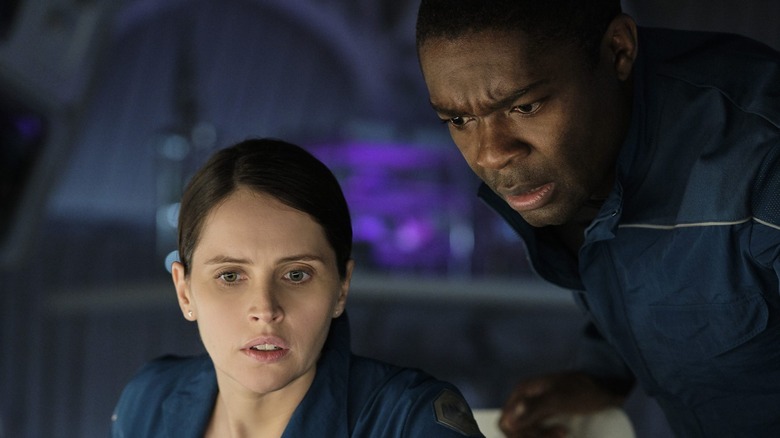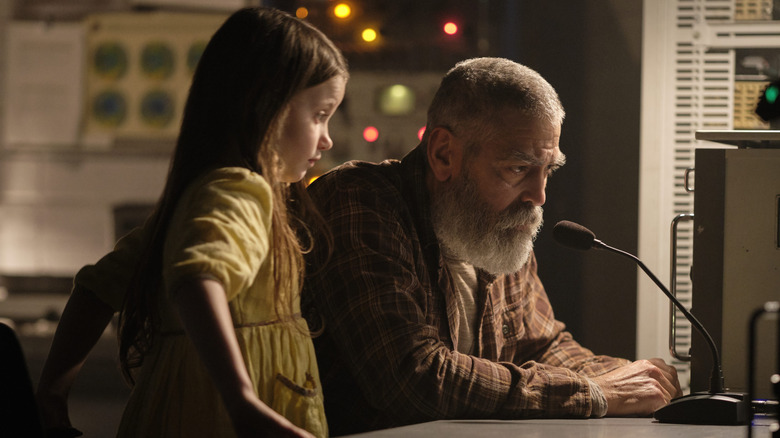The Midnight Sky Ending Explained: It's Very Nice To Finally Meet You
For me, 2020 was already a rather stressful year before the Covid lockdowns went into effect for reasons unrelated to the pandemic. Even as misfortunes both personal and professional piled up throughout the months that followed, the virus, funnily enough, was never directly to blame for my woes. Not that I can really complain; I certainly had a far easier go of it in 2020 than other people, especially when it came to my mental health. My years of working remotely and being a borderline hermit were finally paying off!
You could say my experience was a bit like George Clooney's in "The Midnight Sky." Clooney, who also directed the 2020 film, stars as Augustine Lofthouse, a scientist, and the lone person holed up at an Arctic research station that's been evacuated in the wake of a mysterious global catastrophe that's left most of the Earth's surface uninhabitable in the year 2049. Augustine is terminally ill for reasons unrelated to the apocalypse — he's merely old and more susceptible to the ravages of time — and led a fairly isolated life long before the end of the world. Being in a position to do some good before he dies, Augustine takes it upon himself to contact the Aether, a spacecraft returning from its mission to K-23 (a Jupiter moon that can sustain human life), and warn them not to return to Earth.
"The Midnight Sky" isn't a great film and it sort of stumbled into an unexpected timeliness due to Covid. Yet, I also agree with what /Film's Chris Evangelista wrote in his review: "There's the germ of something beautiful buried in here; a story trying to tell us that every last life is worth saving even if all seems lost." But to better explain that, we'll have to dive into the film's ending.
Helping someone
There are two present-day storylines in "The Midnight Sky." In one, Augustine bonds with a mute girl named Iris (Caoilinn Springall) who was accidentally left behind at the research station with him, before taking her on a treacherous expedition across the stormy Arctic landscape to reach a larger base with the equipment he needs to contact the Aether. In the other, the Aether's crew, including a pregnant astronaut nicknamed Sully (Felicity Jones) and her partner Adewole (David Oyelowo), struggle to repair the vessel's communication equipment and investigate why nobody on Earth is responding to their attempts at making contact.
Linking these threads are the flashbacks to Augustine's past, although that's not immediately apparent. As we come to learn, a younger Augustine (not a digitally de-aged Clooney, thankfully, but a pre-"Star Trek: Strange New Worlds" Ethan Peck) specialized in searching for planets and moons that could potentially be habitable for humans, which led to him meeting and entering a romantic relationship with a fellow scientist named Jean (Sophie Rundle). In time, the pair break up due to Augustine's workaholic behavior before reuniting some years later, at which point we learn they have a daughter whom Augustine has never met.
His daughter's name? Iris ... which, we eventually learn, is also Sully's first name. Yes, Sully is Augustine's daughter grown up. The Iris we've seen him with this whole time was just Augustine (who's in a fragile mental state due to his illness) imagining his daughter as a kid, which explains why she doesn't talk (he doesn't know what the real Iris sounds like) and is oddly resistant to the freezing Arctic conditions. When Augustine finally contacts the Aether, he declines to tell Sully the truth. Instead, he indicates he kept tabs on the vessel's mission because he discovered K-23 himself and moved heaven and earth to reach them believing he could "help someone."
The movie vs. the book
"The Midnight Sky" was written for the screen by Mark L. Smith ("The Revenant") and based on Lily Brooks-Dalton's 2016 book "Good Morning, Midnight." The main difference between the two is the ending, as Augustine and Iris never realize they're related in the novel.
"It's not important that they know; it's important that they begin to make different choices," Brooks-Dalton told Book Club Babble. "That they find their own paths to redemption. In the end, they don't need each other to do that, but I loved the idea of this bigger-than-them moment in which they do finally have this one chance to intersect, and yet the mystery remains."
Of the two endings, I think I prefer the one from the book. Once you've made your peace with the almost cosmic coincidence of Iris being Augustine's daughter without either one of them knowing, you're left with a story about the value of choosing to help others during times of great crisis simply because you're able. "The Midnight Sky" doesn't contradict or erase that message, but it weakens it a little by making it a more heavy-handed and unadventurous story about parents being motivated to do right by their children (a theme that also pops up in a subplot involving the other members of the Aether's crew).
By the same token, "The Midnight Sky" suffers from being too on the nose in the way it tells its story, using dialogue and music (a somber yet hopeful score by Alexandre Desplat that's lovely on its own) to instruct viewers precisely what to feel rather than applying a more restrained hand. But again, circling back to an earlier point, there's a profound observation beneath all the patchy storytelling — one that's only grown more meaningful in the years since the film came out.


